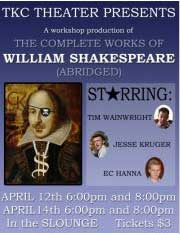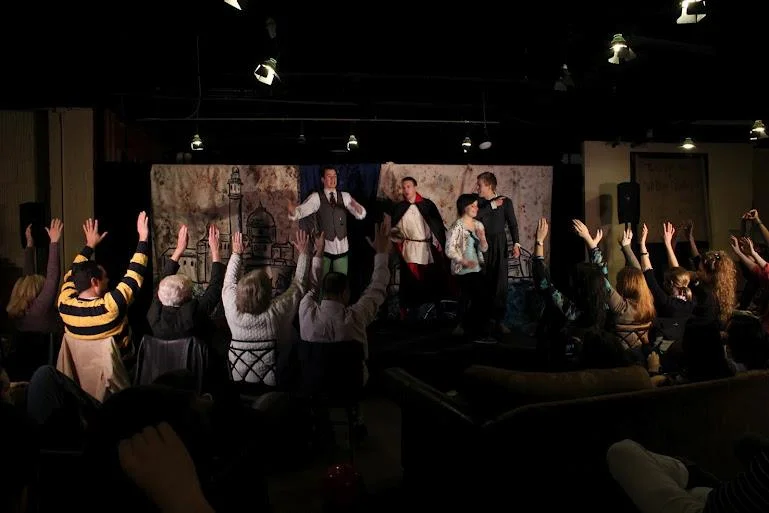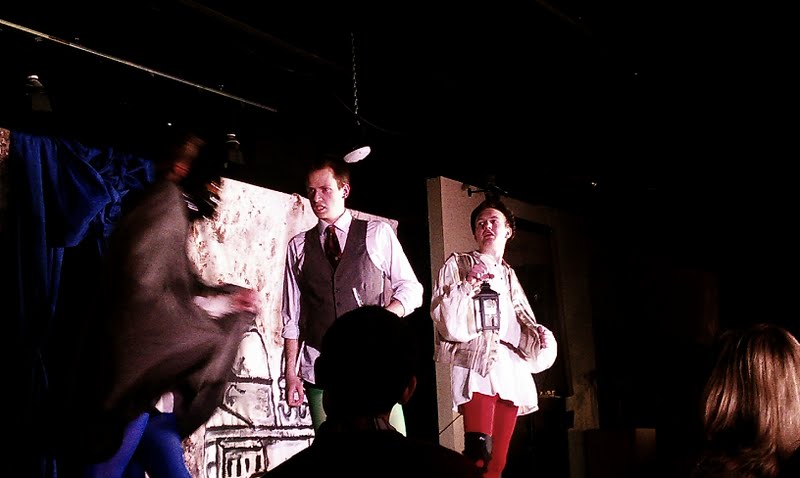TKC's Shakespeare Production Funny Yet Unpolished
 The trouble with plays written about shoddy theaters putting on sub-par productions is the actors' tendency to think, “Even if I mess up, the audience won’t know; they’ll think it’s in the script.” When the actor’s task is to play a bad actor, he may lower his standards. When a theater company’s task is to look like a sub-par theatrical troupe, it may use that premise as a cushion, sometimes allowing the play to fall down on it.
The trouble with plays written about shoddy theaters putting on sub-par productions is the actors' tendency to think, “Even if I mess up, the audience won’t know; they’ll think it’s in the script.” When the actor’s task is to play a bad actor, he may lower his standards. When a theater company’s task is to look like a sub-par theatrical troupe, it may use that premise as a cushion, sometimes allowing the play to fall down on it.
On Thursday, TKC Theater performed a workshop production of The Complete Works of William Shakespeare (abridged), which is an actual play written in 1987 by Adam Long, Will Singer and Jess Winfield. Many students thought the play’s director, Grant DeArmitt, wrote it, which is false. An audience member remarked to her friend after the show that DeArmitt is one talented playwright. One of the actors commented to a student, "It’s a legit play, like out there in the real world."
Overall, the production seemed sub-par compared to the talent of the actors and director. Paradoxically, the cast committed the same errors the play was intended to satirize, falling into the trap of carelessness which often accompanies productions that are meant to poke fun at theater foibles. The director ensured that the play was humorous but not that it was tight and polished.
Cast members and funny men Jesse Kruger, Tim Wainwright and EC Hanna took every opportunity to poke fun at The King’s College. The remark referring to the skull in Hamlet--"This skull had a tongue in it, and it could sing once… and then it moved to Ludlow"--was well-received. References to Dinesh D'Souza and the Politics, Philosophy and Economics major were not in short supply, a trait recycled from TKC’s fall production.
The actors’ projection, articulation and stage manners were somewhat lacking (for example, actors should always gesture with their upstage hand, but these actors frequently used their downstage hand). This may seem nit-picky, but to a common theater guest, it is as expected as a glass of water is at a nice restaurant.
Also, a well-respected rule of comedy is the rule of threes, which states that a joke is only funny the first three times it is told. It’s a basic guideline in the bottom-level improvisation classroom. Many jokes in this production, such as Hanna's vomiting bit, were played more than three times.
Nevertheless, laughter poured forth from the audience. EC Hanna’s energy was phenomenal. He engaged the crowd, who knew what to cheer and what to hate in reference to his character. His voice and laugh as the King in Hamlet were perfectly akin to that of an old bratty aristocrat. EC’s voices were hysterical as well, but the audience would have appreciated more variation.
Tim Wainwright’s costume merits mention: his suit-jacket-over-tights ensemble was a silent tease of King’s dress code, and such creativity is laudable. Wainwright held his own playing the straight man, which is often harder to play than the funny man.
Something else should be noted: the play was labeled “a workshop production.” While this seems minuscule, it has huge connotations in the theatrical circle. Calling the play a "workshop" is a way to take liberties with the script without encountering legal trouble. Furthermore, it’s a way to pay less when purchasing the rights for the play. The other TKC theater production this year, The Good Person of Setzuan, was also a workshop, and understandably so, because the theater budget is limited. If King’s afforded the theater the rights to their productions, they would no longer have the privilege of changing the script.
A look at the script revealed that the authors included specific places for the actors to improvise. Traditionally, the actors use their own names and make fun of each other or the audience. Whether each actor respected the playwrights enough to improvise only when allotted the opportunity by the script, the cast alone knows. This however, should not even be in question. It’s also expected that these improvisations reference pop-culture, although references to Taylor Swift’s career, which has only taken off in the last few years, furthered the false assumption that the play was written recently rather than in 1987. Audience participation is also written into the script. Charlotte Mayfield's and Heather Cate’s performances in the second performance on Thursday were appropriate and not just a random creative liberty.
 The Complete Works of William Shakespeare (abridged) is a fine opportunity for quality theater, not an opportunity to perform poor theater and get away with it. While that was surely not these artists' goal, they seemed to succumb to that temptation. A good indicator of quality theater is that the audience knows the actors are following a script--that it knows the play is real. Many King's students did not know this.
The Complete Works of William Shakespeare (abridged) is a fine opportunity for quality theater, not an opportunity to perform poor theater and get away with it. While that was surely not these artists' goal, they seemed to succumb to that temptation. A good indicator of quality theater is that the audience knows the actors are following a script--that it knows the play is real. Many King's students did not know this.
The backstage happenings of theater—what the actors do when the play they're performing goes haywire—is a common topic for modern theater. A recent example is Laughing Stock by Charles Morey, wherein a theater troupe butchers Dracula and Hamlet. Since most playwrights live and breathe theater, they find their surroundings funny and inspiring and want to share them with an audience.
But what if a playwright saw his play about a play going haywire performed carelessly? He would be appalled. He had written about poor theater for a reason--to make fun of it. You lose the right to make fun of poor theater when, while you’re doing it, your play is not a tight, efficient theatrical machine but a loose cannon. These artists did not deliberately mess around on stage, but they appeared to be doing just that.
TKC theater put on an entertaining workshop of The Complete Works of William Shakespeare (abridged), and this production shows vast improvement from TKC's fall production. Still, this director and these actors are capable of higher quality theater.
UPDATE FROM THE AUTHOR:
The goal of this piece is not to attack TKC's production of The Complete Works of William Shakespeare (abridged). The goal is to edify the progress that TKC theater is making, clarify the history of the play to the student body, articulate the difficulty of the piece and the pitfalls that accompany such a script and finally, to critique the play based on the standards of New York City theater, or institutions these artists aspire to influence. Personally, I thought the play was very funny. I think Grant DeArmitt, Jesse Kruger, Tim Wainwright and EC Hanna are all incredibly talented individuals and are critiqued as such.
Katie Hay is a sophomore MCA major. She critiqued theater for two years for The Cappies Critics and Awards Program in Dallas and starred in last semester's production of The Good Person Of Setzuan. She has also studied theater at UCLA and with Atlantic Theater Company in NYC.


